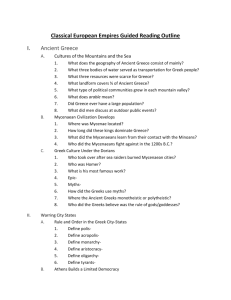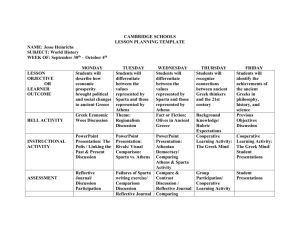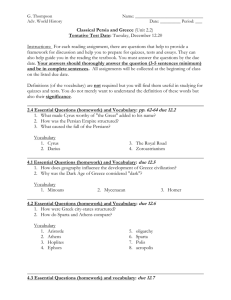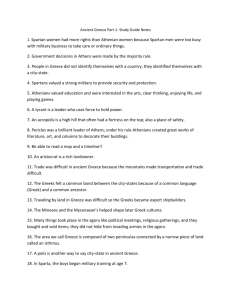The Great Thinkers of Greece
advertisement
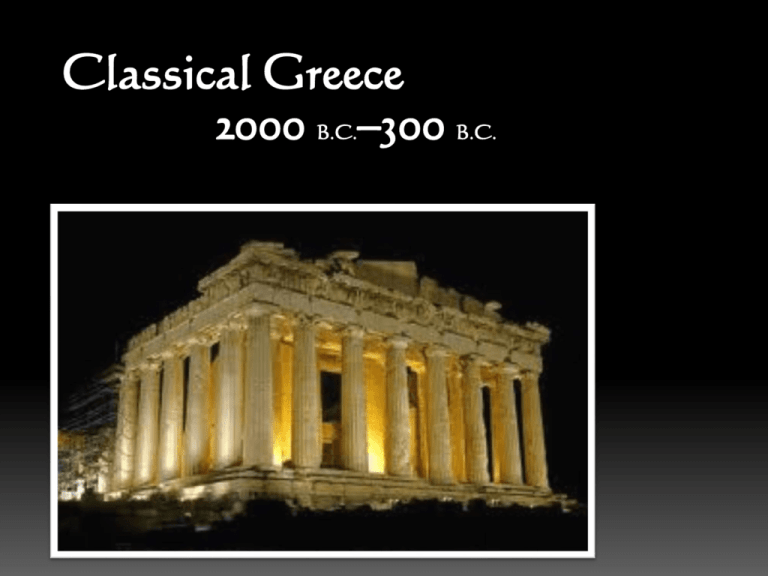
Classical Greece 2000 B.C.–300 B.C. The General Layout • Collection of separate lands where Greek-speaking people live • Includes mainland and about 1,000 islands The Seas • The sea shapes Greek civilization • Proximity to sea, lack of resources encourage sea travel and trade The Land • Mountains slow travel, divide land into regions • Lack of fertile land leads to small populations, need for colonies The Climate • Moderate climate promotes outdoor life • Greek men, especially, spend much of their time outside Mycenaean Civilization Develops Origins • Mycenaeans—Indo-Europeans who settled on Greek mainland in 2000 B.C. • Took their name from their leading city, Mycenae • Mycenaean warrior-kings dominate Greece from 1600–1100 B.C. Contact with Minoans • After 1500 B.C., Mycenaeans adopt Minoan sea trade and culture The Trojan War • Trojan War—fought by Mycenaeans against city of Troy in 1200s B.C. • Once thought to be fictional, archaeological evidence has been found to prove it likely occurred Dorian Civilization Develops Dorians Replace Mycenaeans • Mycenaean civilization collapses around 1200 B.C. • Dorians—possibly relatives of Bronze Age Greeks—move into Greece • Less advanced than Mycenaeans, Dorians leave no written records Epics of Homer • Oral tradition grows, especially epics of Homer—a blind storyteller • Epic—a narrative poem about heroic deeds • Homer’s epic the Iliad, about Trojan War, shows Greek heroic ideal Greek Religion Greeks Create Myths • Greeks develop their own myths—traditional stories about gods • Greeks seek to understand mysteries of life through myths • Greeks attribute human qualities—love, hate, jealousy—to their gods • Zeus, ruler of Gods, lives on Mount Olympus with his wife, Hera • Zeus’s daughter Athena is goddess of wisdom and guardian of cities City-States in Greece • • • • By 750 B.C. the Greek city-state, or polis, is the formal government A polis is a city and its surrounding villages; 50 to 500 square miles Population of a city-state is often less than 10,000 Citizens gather in the marketplace and acropolis—a fortified hilltop • City-states have different forms of government • Monarchy—rule by a king; aristocracy—rule by nobility • Oligarchy—rule by small group of powerful merchants and artisans Tyrants Seize Power • Rulers and common people clash in many city-states • Tyrants—nobles and wealthy citizens win support of common people • They seize control and rule in the interests of ordinary people • About 621 B.C., democracy—rule by the people—develops in Athens Sparta Sparta Dominates Messenians • Around 725 B.C., Sparta conquers Messenia • Messenians become helots—peasants forced to farm the land • Harsh rule leads to Messenian revolt; Spartans build stronger state Sparta’s Government and Society • Sparta government has four branches; citizens elect officials • Three social classes: citizens, free noncitizens, helots—slaves Spartan Daily Life • Spartan values: duty, strength, individuality, discipline over freedom • Sparta has the most powerful army in Greece • Males move into barracks at age 7, train until 35, serve until 60 • Girls receive some military training and live hardy lives • Girls also taught to value service to Sparta above all else A New Kind of Army Emerges • Cheaper iron replaces bronze, making weapons and armor cheaper • Leads to new kind of army; includes soldiers from all classes • Phalanx—feared by all, formation of soldiers with spears, shields The Persian Wars Battle #1: 490 B.C. Battle #2: 480 B.C. Persian naval fleet and Battle at Thermopylae army attacks the Athenians at Marathon Athens wins Messenger Pheidippides races to Athens to announce Greek victory 7,000 Spartans v. 180,000 Persians Sparta held off the massive Persian military for 2 days Consequences of the Persian Wars • • • • • New self-confidence in Greece due to victory Athens emerges as leader of Delian League Athens controls the league by using force against opponents League members essentially become provinces of Athenian empire Stage is set for a dazzling burst of creativity in Athens War Begins • 431 B.C. city-states Sparta and Athens at war—Peloponnesian War Peloponnesian War • Sparta has better army, Athens has better navy • Plague strikes Athens in 430 B.C., kills many—including Pericles • Sparta and Athens sign truce in 421 B.C. Sparta Gains Victory • 415 B.C. Athens renews war, attacks Syracuse; is defeated in 413 B.C. • Athens and allies surrender to Sparta in 404 B.C. The Great Thinkers of Greece • Socrates—believes in questioning, self-examination of values, actions - Ended up costing him his life, he was forced to drink hemlock • Plato—student of Socrates; writes The Republic—an ideal society • Aristotle—student of Plato; uses rules of logic for argument - Personal tutor of Alexander the Great Macedonia • Macedonia—kingdom of mountain villages north of Greece • King Philip II—ruler, brilliant general; dreams of controlling Greece • Macedonians call themselves Greek; rest of Greece does not Philip’s Army • Philip creates well-trained professional army; plans to invade Greece Conquest of Greece • • • • 338 B.C. Macedonians defeat Greece; 336 B.C. King Philip murdered His son named king of Macedonia—becomes Alexander the Great Alexander marches into Egypt, crowned pharaoh in 332 B.C. Alexander conquers Indus Valley area in 326 B.C. Reluctantly returns to Babylon, dies in 323 B.C. • Hellenistic culture—Greek blended with Egyptian, Persian, Indian What Made Him Great? -He fought alongside his men on the front lines -Was strict and harsh in his ways when crossed -He had a love for culture and knowledge married non-Greek women -Always on the cutting edge of warfare technology and stagey


